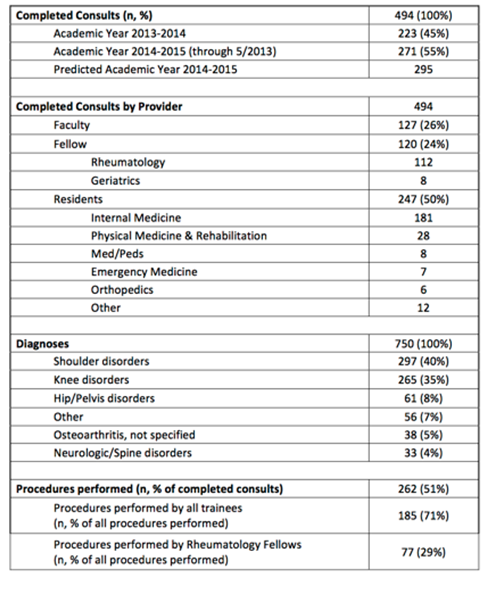Session Information
Date: Tuesday, November 10, 2015
Title: Education Poster II
Session Type: ACR Poster Session C
Session Time: 9:00AM-11:00AM
Background/Purpose:
Musculoskeletal
(MSK) disorders are common in primary care (PC), however many of these problems
are referred to specialty clinics for evaluation and management. High referral
rates are partly due to lack of providers’ time to fully evaluate the patient
during routine clinic appointments, but may also be due to lack of clinicians’
experience and training in MSK diseases. To improve patient access to specialty
services while aligning with current medical home models, a Primary Care MSK
Clinic (PC MSK) was implemented at a Veterans Affairs (VA) Medical Center. The
PC MSK Clinic has since become an integral part of our clinical training
program, increasing trainees’ exposure to MSK disorders.
Methods:
The PC MSK
clinic was initiated by a Physician Assistant with orthopedic experience who
also works in the general outpatient PC clinic. Soon after implementation, the
value of this clinic to the clinical training environment was recognized. A
rheumatologist clinician-scholar-educator was invited to attend, and to assist
in the cultivation of this resource for rheumatology fellows and other
trainees. Most recently, the clinic staffing has been expanded to include an
orthopedic Doctor of Physical Therapy. The PC MSK clinic is held one-half day
per week within the primary care clinical setting. One rheumatology fellow and
1-2 ambulatory residents are assigned to attend the clinic weekly. Students
from medicine, physician assistant, and nurse practitioner programs may also be
assigned to this clinic during their clinical rotations.
Results:
A total of
494 consults have been completed since June, 2013; details are presented in the
table.
Conclusion:
The Primary Care MSK
Clinic is a feasible and sustainable innovation that provides a unique and
efficient clinical experience for medicine trainees. The clinic supplies a high
volume of supervised MSK patient encounters that are not typically obtained in traditional
rheumatology training experiences or other IM resident rotations. Many of these
encounters also involved arthrocentesis and/or joint injections. Additionally,
this clinic may serve an important role in improving patient access to
appropriate care, and in helping to prioritize specialty referrals.
To cite this abstract in AMA style:
Barker AM, Cannon GW, Lawrence P, Huhtala TA, Wooldridge L, Battistone MJ. Enhancing Medicine Trainees’ Exposure to Common Musculoskeletal Disorders through a Primary Care Musculoskeletal Clinic [abstract]. Arthritis Rheumatol. 2015; 67 (suppl 10). https://acrabstracts.org/abstract/enhancing-medicine-trainees-exposure-to-common-musculoskeletal-disorders-through-a-primary-care-musculoskeletal-clinic/. Accessed .« Back to 2015 ACR/ARHP Annual Meeting
ACR Meeting Abstracts - https://acrabstracts.org/abstract/enhancing-medicine-trainees-exposure-to-common-musculoskeletal-disorders-through-a-primary-care-musculoskeletal-clinic/

